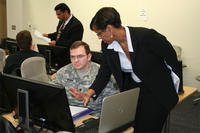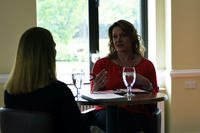"Networking is the key to success in business,” says business guru Keith Ferrazzi in his recent book, Never Eat Alone. Networking is supposed to be a constant activity at every single lunch.
I’m going out on a limb here, but it’s a safe guess that Ferrazzi hasn’t spent much time on a military base. Unless you are in the business of the military or government contracting, meeting anyone on a military base can be difficult.
Actually networking in your field is next to impossible. There’s no how-to book for that.
Military brat and better business guru Lauren Fritsch knows the unique challenge facing military spouses. Lauren provides the brains behind The Magnetisim Factor, where she helps everyone from small business owners to political powerhouses and world leaders build their best professional selves.
Fritsch knows that even if no one you know works in your field, building out your professional network while at a military installation is possible. You’ll be able to network in your field – and network your way right into a job.
Start Small
Word of mouth is the most powerful means of professional connection, so start with the people you know. Just like military life forced you to be proactive about making friends, you need to be proactive about making colleagues.
Talk to everyone you know – neighbors, friends, the lady at the dry cleaner - openly about your career goals and competencies.
Lauren says that the bulk of her business comes from word-of-mouth references. As you build your network, you want that word-of-mouth to be informed and glowing.
Conversation is a way for you to generate buzz about yourself. Be honest about what you want, what you’ve done, and where you want to go. Even if no one knows anyone who does, say, molecular biology, someone might know someone who does something similar. If they can put you in touch, you are one step closer to putting a concrete contact in your professional network.
Reach out to your past
Reach out to the people who’ve helped you get where you are today, too. Teachers, advisors, former employers, and alma maters can be great resources as you start networking.
Ask your past contacts if they know anyone in your region with whom you might connect to talk shop or just to get to know another businessperson in the area. Be honest with them about what you’re looking for, and ask them to keep you in mind if they think of anything that might help.
Get off the ranch.
Once you’ve tapped into the people around you, it’s time to branch out. “For military spouses, it’s so important to get out of the bubble,” says Lauren. “Any time you have a self-contained environment, where everyone has a similar perspective and similar challenges, you need to get off the ranch to get things done.”
"Getting off the ranch” was just the ticket for Jessica, a young Marine Corps wife interested in advertising sales. When she and her spouse first moved to Twentynine Palms, CA, she was sure the PCS was a death-sentence for her would-be career.
"I had yet to really get any experience,” Jessica said, “and now we were moving to the dessert. It might as well have been the moon.”
But Jessica wasn’t going to let a pesky PCS and a future of sand and scorpions ruin her job hopes. As soon as they arrived in California, Jessica asked everyone she met if they had any job leads for her. “No one knew anything about advertising sales. I think they thought I was crazy,” she laughs now, “but it really did work.”
It wasn’t long before a friend of a friend suggested getting in touch with someone in the hospitality industry in not-far-away Palm Springs. “Hospitality wasn’t what I was going for, at all,” Jessica says, so she shrugged off the reference at first.
A week later, Jessica thought better of it. S,he went to visit the friend-of-a-friend’s connection at the hotel. “Of course hotels have to advertise,” she said. “You see their ads in magazines. Well, someone’s selling that.”
The connection was one she would have never made if she hadn’t kept asking for help. Jessica immediately applied for the hotel’s summer internship program, and a year later, she’s now happily employed at a sister-hotel not far away.
It was really kind of random,” she says. “But I guess that’s the way most jobs are found. I’m just glad I kept saying something.”
Jessica’s determination to keep asking everyone around her if they knew anyone could help is exactly what Lauren is talking about. The connection that got her to a real job couldn’t have been more tenuous, but it was enough to get her foot in the door. “I still don’t know the name of the friend-of-the-friend,” said Jessica.
Make a list of five
As you start the process yourself, take a few minutes today to sit down and start a rough list of people you can talk to for starters. Try for five names – old teachers from high school, a boss or a boss’s spouse, the friend who seems to know everyone – and make a list of those you plan to contact first.
Once you know who you’re going to start with, it’ll be a lot easier to figure out what to say them. (And yes, “Hi, I’m looking for work,” is a totally okay place to start.) If you’re nervous about writing an email asking for help, don’t be.
We’ve got your guide on how to do it (and not feel stupid) right here, but remember: the phone is a lot less scary and a lot more personal. So today, take a few minutes to brainstorm your list. Tomorrow, take a few minutes to start getting in touch.
For more information on networking, be sure to check out the rest of our networking resources and how-to’s, and take the time to visit Lauren’s website for more.























